

You Are Tired (I Think) by ee cummings. Write & Get Paid. Get Paid $100 Do you want to earn money online?

Listverse was built on the efforts of readers just like you. Readers who didn’t have any experience as writers but decided to put a list together and send it in. So here is the deal: We will pay you $100 for your efforts. You don’t need to be an expert—you just need to have English equal to that of a native speaker, a sense of humor, and a love for things unusual or interesting. It works like this: You write your list (10 items per list minimum), you send it in, we reply and say “Great—we’ll publish it” and send you $100 by PayPal (don’t have an account? Either way you win—your list will be read by us and reviewed, and if it’s amazing it will appear on the front page of Listverse to be read by millions of people a month! We can not accept lists from writers who do not have a PayPal account; this is non-negotiable. The Rules The rules are really pretty simple. Pictures and Video Please note that we publish original articles.
Ready to start? Ono no Komachi. Very little is known about this Japanese poetess, and most of it is legendary.
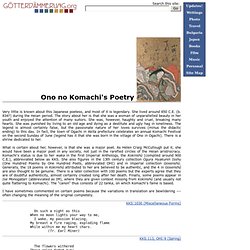
She lived around 850 C.E. (b. 834?) During the Heian period. The story about her is that she was a woman of unparallelled beauty in her youth and enjoyed the attention of many suitors. She was, however, haughty and cruel, breaking many hearts. What is certain about her, however, is that she was a major poet. I have sometimes commented on certain poems because the variations in translation are bewildering --- often changing the meaning of the original completely. KKS:1030 (Miscellaneous Forms) On such a night as this When no moon lights your way to me, I wake, my passion blazing, My breast a fire raging, exploding flame While within me my heart chars.
KKS:113, OHI:9 (Spring) The flowers withered Their color faded away While meaninglessly I spent my days in the world And the long rains were falling. I am Your Tomorrow by Helen. Free Audiobooks and eBooks - Librophile. Nature of Her Heart - Poetry Poetry - Poetry, Poem, Girl. Reading Poems Backward. It probably happens now and then, though perhaps you don’t give it much thought.
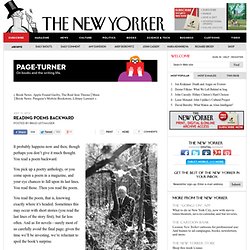
You read a poem backward. You pick up a poetry anthology, or you come upon a poem in a magazine, and your eye chances to fall upon its last lines. You read those. Then you read the poem. You read the poem, that is, knowing exactly where it’s headed. Reading a poem backward is a distinctive experience, during which you’re typically asking not Where is this going? Say you read Keats’s sonnet “When I have fears that I may cease to be” backward. Then on the shore Of the wide world I stand alone, and think Till love and fame to nothingness do sink.
You then proceed to the start, aware that the poem is going to entail a throwing off of earthly cares and concerns. The other day, I took down from a friend’s bookshelf Conrad Aiken’s anthology “Modern American Poets” (1927). I fell upon its amenable concluding couplet: “Ah, yes; ah, yes; ah, yes, indeed, / Verily yes, ah yes, indeed!” 50 Amazing and Essential Novels to Enrich Your Library. Post written by Leo Babauta.
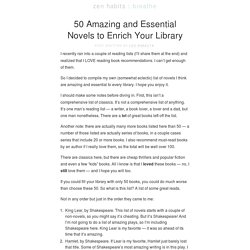
I recently ran into a couple of reading lists (I’ll share them at the end) and realized that I LOVE reading book recommendations. I can’t get enough of them. So I decided to compile my own (somewhat eclectic) list of novels I think are amazing and essential to every library. I hope you enjoy it. I should make some notes before diving in. Poet Seers. PABLO NERUDA - Love. I Write Like Stephen King. Become a better writer!
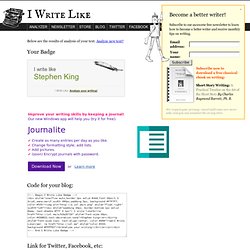
Subscribe to our awesome free newsletter to learn how to become a better writer and receive monthly tips on writing. We respect your privacy: email addresses are never sold, and you can unsubscribe at any time. Below are the results of analysis of your text. Analyze new text? Your Badge Code for your blog: <! Link for Twitter, Facebook, etc: I write like Stephen King.
Link to share with your friends Analyze another text. Rate Books. Tim Burton's: The Melancholy Death of Oyster Boy. Your Free Numerology Reading. Allegory of the Cave. Plato realizes that the general run of humankind can think, and speak, etc., without (so far as they acknowledge) any awareness of his realm of Forms.
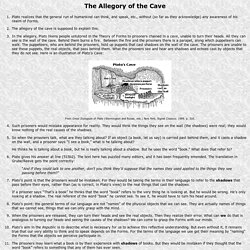
The allegory of the cave is supposed to explain this. In the allegory, Plato likens people untutored in the Theory of Forms to prisoners chained in a cave, unable to turn their heads. All they can see is the wall of the cave. Behind them burns a fire. Between the fire and the prisoners there is a parapet, along which puppeteers can walk. From Great Dialogues of Plato (Warmington and Rouse, eds.) Here are some students’ illustrations of Plato’s Cave Go back to lecture on the Phaedo Go back to lecture on the “One Over Many” Argument.
The end of a story by Andy Cave.